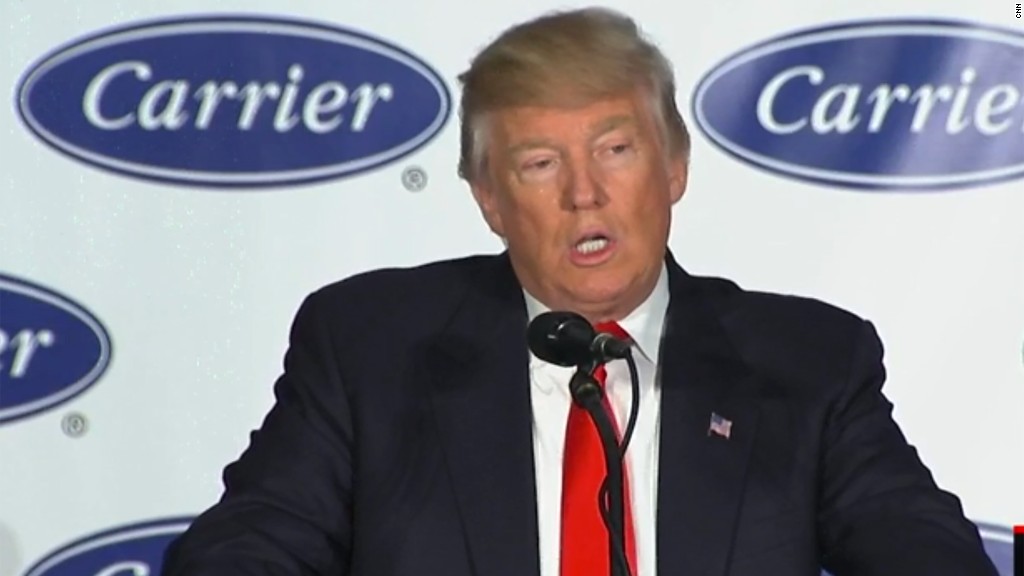
President-elect Donald Trump wants to tax U.S. companies that move jobs to Mexico.
Trump tweeted Sunday that "there will be a tax on our soon to be strong border of 35% for these companies," that move jobs abroad.
But it's easier said than done for Trump to pick and choose companies that would pay a higher tax. First, Trump's tactic goes against how tariffs are generally imposed.
"Tariffs are imposed on products, not on companies," says Robert Scott, a trade expert at the Economic Policy Institute.
Trump would need Congress to approve taxing any particular U.S. company for moving jobs to Mexico, according to Gary Hufbauer, a trade expert at the Peterson Institute of International Economics.
But Congressional leaders signaled Monday that Trump's idea of a 35% tariff on U.S. companies may not be the best option.
"I believe there is a better way of solving a problem than getting into a trade war," House Majority Leader Kevin McCarthy told reporters Monday.
But Trump has the option of pursuing another route if he is determined to punish job-moving companies. It's one that's never been done directly against an American company, even though the U.S. has used this tactic to impose tariffs on Chinese steel.
Trump could initiate an investigation into any U.S. company with employees in Mexico and accuse it of "dumping" onto the U.S. market. That means the company is unfairly using its advantage of operating in Mexico and selling its product at a cheaper price than its competitors in the U.S. can afford to sell.
Related: Trump doubles down on 35% tariff threat
Trump will need to pass through two other hurdles to accomplish this.
1. The Commerce Department will have to determine whether the company has been dumping or benefiting from subsidies, like local tax incentives in Mexico. The department runs the scenario though a series of tests. Trade experts say the tests could be politically influenced because they leave a lot of room for interpretation. Trump's Commerce Secretary pick, Wilbur Ross, could possibly help with getting over this hurdle.
2. At the same time, the U.S. International Trade Commission must determine that the dumping has caused harm on a U.S. industry like steel or autos.
The trade commission is not an organization that gives in easily to arm twisting. It is always made up of six members with no more than three of them from one political party, Democrat or Republican. Each member serves nine-year terms to avoid political conflicts.
But it has never investigated a U.S. company for dumping products on the U.S. market.
"It would be very hard under U.S. trade laws to go after a specific company in the fashion that Trump has outlined," says Edward Alden, a trade expert and author of "Failure to Adjust: How Americans Got Left Behind in the Global Economy."
Even though the U.S. Commerce Department hasn't directly imposed tariffs on a U.S. company, it has applied them to firms that are associated with U.S. companies, a spokesperson told CNNMoney. Commerce officials could not immediately provide an example of those instances.
The United States Trade Representative, which also oversees tariffs, did not respond to an email and multiple phone calls seeking comment.
Related: 3 ways Trump can raise tariffs on China and Mexico
It's important to remember that Trump can slap tariffs on specific products, like cars, without input from Congress. Hufbauer, the trade expert, outlined several ways Trump can skirt Congress and slap huge tariffs on certain items.
But targeting a tariff on a product made by one company, for example a Ford Fusion, would be very hard to do under current law.
Plus, the argument behind the investigation doesn't add up. It's very hard to prove that a company like Ford is dumping in America and hurting the U.S. auto industry, when its American competitors also have operations in Mexico.
"The grounds are very weak both as to the existence of a subsidy or dumping," says Hufbauer.
Perhaps the legal details are besides the point. The mere threat of a 35% tariff for moving jobs to Mexico could spook companies enough to stay in the country, some say.
"The purpose of this is to intimidate companies from relocating production outside the United States," says Alden. "Even if you don't have the legal mechanisms, just having the president make those types of threats will make companies think twice."
--Manu Raju contributed reporting to this article


